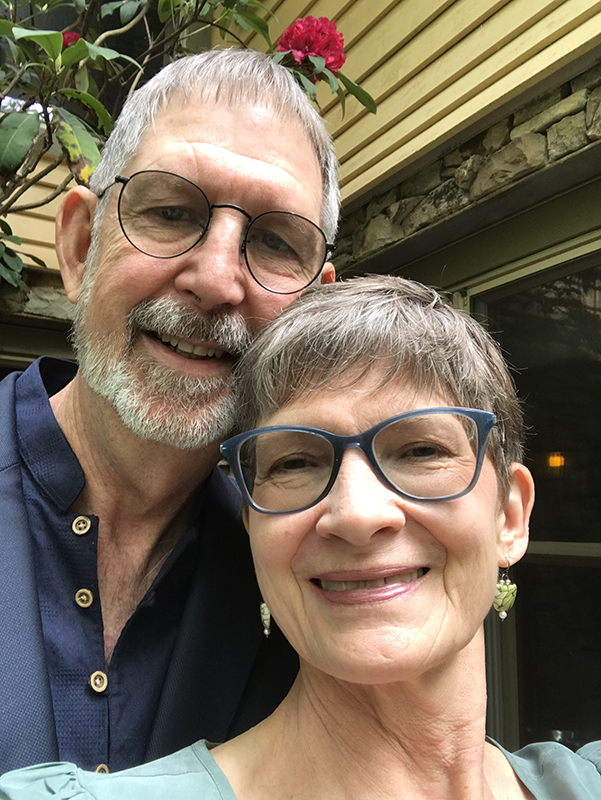Special Feature: Christine Hale on Kevin McIlvoy’s “Gemels”
5 Minutes Read Time

Assistant Managing Editor Bess Winter:
Christine Hale’s powerful essay, “His Body,” is featured in issue 21.1. In it, she explores love, grief and mourning as she details her experience dealing with the death of her partner, beloved writer Kevin “Mc” McIlvoy. Christine was gracious enough to expand on her piece for us in this short essay and accompanying poem by Mc.
Listen to Christine Hale read this essay and “Gemels”:
On “Gemels”
I’m the author of “His Body.” This segmented essay juxtaposes my experiences with my dead beloved’s body, emergency eye surgery, theories of extramission, green burial, and self-grafting in trees. The piece mentions “inosculation” and “gemels,” terms for that naturally occurring fusion resulting from proximity and abrasion. I originally learned these words from a poem, “Gemels,” by my husband Kevin “Mc” McIlvoy, written and shared with me not too long before his sudden death and included in a posthumously published book of his poems, Singing Lessons (Press 53, April 2024). In the eighteen months since he died, I’ve worked on bringing to fruition his final three books while also beginning my own series of essays, including “His Body,” with the result that our art, as were our lives, continue to be entwined.
I began “His Body” within days of his death, as something to hold onto in the freefall of loss. In the writing, I sought to honor the mysteries of our very romantic love and to face squarely the shock of its harsh cutoff. As I drafted and revised and revised the piece, I noted I was borrowing from his poem, wondered anxiously if that was “okay,” and pretty quickly realized it was inevitable, given the nature of our relationship, which his poem evokes in all its real-life complexity.
Mc deeply appreciated and was inspired by paradox, and taught me, by example in life and in art, to embrace it. A definition of paradox: the tension of holding in body and mind two seemingly contradictory truths. An example of paradox: his leaving tore a hole in me that cannot be repaired and since his death our relationship continues, because my art is now sprouting from his art. People express astonishment that I’ve undertaken to complete, produce, and promote three posthumous books for him, but of course I would do that; finishing what he began is as natural and necessary to me as drawing breath. That work is, as his poem expresses, another “production job in . . . close quarters” of the kind we engaged in all our fourteen years together.
My linked essays so far center on “the wobble” in my efforts to find footing in widowhood, as I try to manage the rawness and dividedness of my emotions by engaging with my long-established Buddhist practice of inviting clarity: feeling what I feel while simultaneously seeking awareness of how those feelings torque my sense of who I am, who I was, who I might become. In my writing I want to acknowledge clearly the painful diminishments of aging and dying and the unanticipated regenerations arising inside mourning and remembrance. This process snags, at present, on a strange inner battle between on the one hand my intellect’s compulsion to ditch all faith in romantic love because my lover is gone, and on the other hand my heart’s certainty of the ineffable joys—a species of miracle—our bond gave us.
I could borrow the phrase “warring singular impulses” from Mc’s poem to describe what I am experiencing. Or, better—because I think “Gemels” captures all of this more succinctly and evocatively than I can in this post—I can simply share his poem with you.
Gemels
is the name for trees
like us, growing in
the same production
job in such close
quarters that we join
root, trunk, branch.
When you say, “Make a pear,”
together we bear the fruit.
When I say, “Let the flesh be sweet,”
together we sweeten.
Who doesn’t fight the fusing of
skin and torso and phloem?
We fight – of course we do.
Of course. Our fighting has
inosculated us into
warring singular impulses.
Who doesn’t resist bearing the other’s
fruiting, dimming, dying process?
We complain,
just as you’d guess.
I say, “What ‘us’?”
You say, “Your place or mine?”
The dividing bitterness between us
pours out as laughter conjoined.
As laughter, yes. Together we
wear our wearing out,
our sloughing off,
our bowing down.
At the time of
our final harvest
you ask,
“Will we bear this?”
I ask,
“Will we bear this?”
For us, the last kiss
will come all at once.
–Kevin McIlvoy
Christine Hale is the author of a novel, Basil’s Dream (Livingston Press, 2009), and a memoir, A Piece of Sky, A Grain of Rice (Apprentice House Press, 2016). Her short fiction and nonfiction pieces have appeared in numerous journals, including Arts & Letters, The Sun, Still, Hippocampus Magazine, and Prime Number Magazine.
